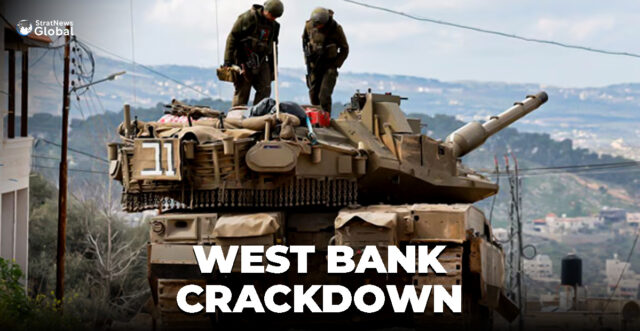Israeli bulldozers have razed large sections of the nearly deserted Jenin refugee camp in the northern West Bank, carving wide roads through its former maze of alleys, mirroring tactics used in Gaza as troops prepare for a prolonged presence.
Jenin Crackdown
At least 40,000 Palestinians have left their homes in Jenin and the nearby city of Tulkarm in the northern West Bank since Israel began its operation just a day after reaching a ceasefire agreement in Gaza after 15 months of war.
“Jenin is a repeat of what happened in Jabalia,” said Basheer Matahen, spokesperson for the Jenin municipality, referring to the refugee camp in northern Gaza that was cleared out by the Israeli army after weeks of bitter fighting. “The camp has become uninhabitable.”
Demolition Continues
He said at least 12 bulldozers were at work demolishing houses and infrastructure in the camp, once a crowded township that housed descendants of Palestinians who fled their homes or were driven out in the 1948 war in what Palestinians call the ‘Nakba’ or catastrophe at the start of the state of Israel.
He said army engineering teams could be seen making preparations for a long-term stay, bringing water tanks and generators to a special area of almost one acre in size.
No comment was immediately available from the Israeli military but on Sunday, Defence Minister Israel Katz ordered troops to prepare for “a prolonged stay”, saying the camps had been cleared “for the coming year” and residents would not be allowed to return.
Northern West Bank Operations
The month-long operation in the northern West Bank has been one of the biggest seen since the Second Intifada uprising by Palestinians more than 20 years ago, involving several brigades of Israeli troops backed by drones, helicopters, and, for the first time in decades, heavy battle tanks.
“There is a broad and ongoing evacuation of population, mainly in the two refugee camps, Nur Shams, near to Tulkarm and Jenin,” said Michael Milshtein, a former military intelligence official who heads the Palestinian Studies Forum at the Moshe Dayan Center for Middle Eastern and African Studies.
“I don’t know what the broad strategy is but there’s no doubt at all that we didn’t see such a step in the past.”
Permanent Displacement Feared
Israel launched the operation, saying it intended to take on Iranian-backed militant groups including Hamas and Islamic Jihad that have been firmly implanted in the refugee camps for decades, despite repeated Israeli attempts to root them out.
But as the weeks have gone on, Palestinians have said the real intention appears to be a large-scale, permanent displacement of the population by destroying homes and making it impossible for them to stay.
“Israel wants to erase the camps and the memory of the camps, morally and financially, they want to erase the name of refugees from the memory of the people,” said 85-year-old Hassan al-Katib, who lived in the Jenin camp with 20 children and grandchildren before abandoning his house and all his possessions during the Israeli operation.
Already, Israel has campaigned to undermine UNWRA, the main Palestinian relief agency, banning it from its former headquarters in East Jerusalem and ordering it to stop operations in Jenin.
“We don’t know what is the intention of the state of Israel. We know there’s a lot of displacement out of the camps,” said UNRWA spokesperson Juliette Touma, adding that refugees had the same status regardless of their physical location.
(With inputs from Reuters)





